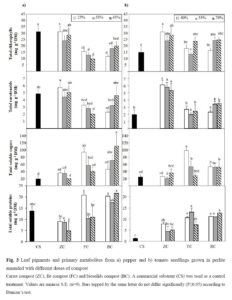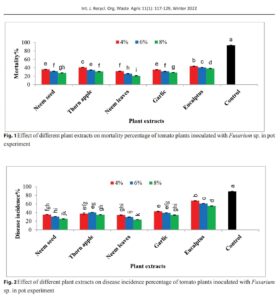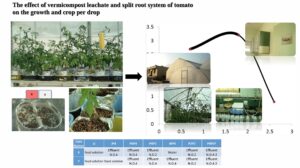Purpose The experiment was performed to determine the effect a commercial potting mix partially replaced with dewatered aquaculture effluent had on tomato transplant growth. Methods The experiment was designed as a 2 9 3 factorial and evaluated two water sources (water-soluble, inorganic fertilizer or municipal water) and three soilless substrates with 0, 5 or 10 […]
Purpose Faecal sludge (FS) has been co-composted with many organic solid wastes globally. Agricultural wastes, such as oil palm empty fruit bunches (EFB) and cocoa pod husks (CPH), have received very little research attention as far as combining with FS is concerned. This study aimed at co-composting these wastes at different ratios to produce safe […]
Purpose The investigation of the phytoextraction potential of three vegetable plants grown in soils amended with decanter cake. Method Pot experiments were conducted to investigate the response of decanter cake composition on the phytoextraction of metals (Mg, Zn, Ni and Cu) by lady’s finger, tomato and brinjal plants. The phytoextraction properties of these plants were […]
Purpose A field study was conducted at Dire Dawa, Eastern Ethiopia, with an objective to find out an optimum combination of inorganic (NP) fertilizer and excreta-based vermicompost for best economic yield and quality of tomato and to assess their effect on selected physicochemical properties of amended soil after crop harvest. Methods The experiment consisted of […]
Purpose The decreasing number of peatlands has driven the search for new cultivation substrates. The aim of this study was to evaluate the use of different composts as growing media in the production of vegetable seedlings (pepper and tomato). Method Composts were produced from: discarded carrots (ZC), fats (FC), and biosolids (BC) from the dairy […]

Purpose The investigation of the different plant waste parts for ecofriendly management of Fusarium sp. was carried out. Method The disease associated fungus was isolated from the diseased specimen and purified. The twelve different aqueous plant extracts were prepared and evaluated against test pathogen in laboratory, pots and in filed conditions. Results Among the tested […]

Purpose: This study aimed to investigate the effects of vermicompost leachate on the growth and water use of tomatoes in an unequal distribution of salinity in a hydroponic system. Method: Roots of tomato seedlings were separated into approximately two equal parts, each half was grown in a media culture part containing a 3-liter perlite and […]
